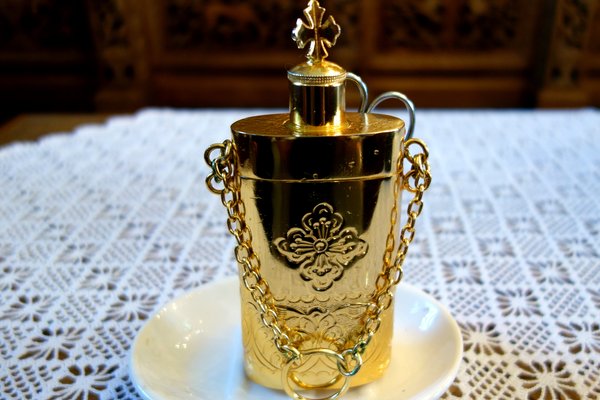People refer to Baptism and Christening interchangeably as if referring to the one and same thing. But these are two separate Sacraments of the Church.
A Baptism (Gk. meaning to immerse) occurs first when the Priest immerses the candidate in water in the name of the Holy Trinity.
A Christening occurs immediately after Baptism when the Priest anoints the candidate with Holy Myrrh administering the seal of the Holy Spirit and confirming the candidate into the faith. A Christening is also referred to as a ‘confirmation’, or ‘Chrismation’ (Gk Chrisma), meaning to anoint.
Holy Chrism was introduced to the Church from the tradition of the Old Testament where God instructed Moses saying, “Take the finest spices ‑‑ 12 pounds of liquid myrrh, 6 pounds of sweet‑smelling cinnamon, 6 pounds of sweet cane, and 12 pounds of cassia. Add one gallon of olive oil, and make a sacred anointing oil, mixed like perfume.” (Exodus 30:22‑25)
The purpose of Chrismation is to transfer the gifts of the Holy Spirit to the candidate immediately after Baptism. In the Old Testament it was prophesied by the Prophet Joel that there would come a time when God would pour out His Spirit to the whole world saying, “I will pour out my Spirit on all flesh.” (Joel 2:28)
The Prophet Ezekiel foretold of the same outpouring even making specific reference to water and the Spirit – foretelling of Baptism and Chrismation.
“I will sprinkle clean water on you, and you will be cleansed from all your uncleanness…” “I shall put My Spirit within you and cause you to walk in My requirements, and you will keep My judgments and do them.” (Ezekiel 36:25-28)
The fulfillment of these prophecies occurred on the day of Pentecost where Christ’s promise came to pass that a Helper (the Holy Spirit) was to follow Him after departing from this world saying, “I will pray to the Father, and He will give you another Helper, that He may abide with your forever.” (John 14:16)
In Apostolic times the gifts of the Holy Spirit were transmitted via the laying of hands on candidates immediately after their Baptism. Given the rapid spread of the faith however, for practical reasons the laying of hands was replaced by anointing with Holy Myrrh.
Holy Myrrh is made of 57 sweet smelling spices and substances that are combined with olive oil. The preparation and special blessing of Holy Chrism is conducted at a series of special services by the Ecumenical Patriarch in Constantinople during Holy Week commencing on Palm Sunday and concluding on Holy Thursday. The frequency of Holy Chrism’s preparation is based on need. In the 20th century for example it was prepared on 9 separate occasions by the Ecumenical Patriarchate. Once prepared, Holy Chrism is distributed world wide to all canonical Bishops and then the Priests of all Orthodox Churches, stored in ornate metallic containers for use when conducting the Sacrament.
In the service, the Sacrament of Chrismation commences immediately after Baptism when the Priest anoints the candidate with Holy Chrism.
Fr Emmanuel Stamatiou















